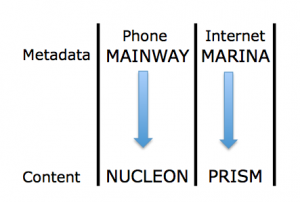Ben Wittes, Brookings Buck Naked
Ben Wittes tries to respond to my complaints that he continues to insist all of Congress had a way of knowing about the Section 215 dragnet program and its abuses — THEY ARE NAKED, Wittes proclaims over and over while accusing me of spewing a “storm of outrage.”
My case, remember, is based on two discrete facts, only one of which Wittes even tries to address in his rebuttal.
First, the 93 Representatives elected in 2010 were never provided access to the letter the Administration wrote, ostensibly to inform them about the dragnet so they could make an informed vote. Assuming that the 7 members of the House who were on the Intelligence and Judiciary Committees learned of the program, that still left 86 members of the House who never had an opportunity to read about the secret use of Section 215 and the gross violations of it. Of those, 65 voted in favor of the PATRIOT reauthorization.
Here’s how Ben responds to this, in the 28th paragraph of his response.
Ms. Wheel insists that the 65 freshman members of the House who were not provided the 2011 briefing [note his inaccurate portrayal of this fact] might have swung the 250-153 vote for FISA reauthorization. She’s almost certainly wrong. On July 24, 2013, well after the public revelations of Section 215 bulk metadata collection hit the press and the butt-covering had begun, the House had the chance for a do-over. It voted on the Amash-Conyers amendment to halt NSA’s “indiscriminate” collection of telephony metadata. The House declined on a 217-to-205 vote to adopt it.
Ben presents evidence of a 33-vote swing at a time before the Administration released the notice letters or the White Paper that provided sanitized descriptions of the program abuses, or the Primary Order showing some other fairly troubling details of the program, to say nothing of the 2009 documents showing the government had enabled chaining four hops deep off of 27,090 approved selectors to find informants as well as terrorists, and claims it is proof that Members of Congress won’t change their vote based on full information about these programs. (At least one member has actually stated on the record he would now vote differently on Amash-Conyers given some of these more recent revelations.)
Ben’s argument remains the same then — pointing at votes that happen without full information about a program as proof that Congress supports that program. NAKED!
But Ben fails to even hint at the other critical fact here, the evidence we have about the briefings that those 83 and other House members had available, in spite of the fact he makes this assertion:
So we know beyond any shadow of a doubt that the administration wanted members to have certain detailed information about the program. We also know that there were a lot of briefings by that administration concerning this program to those same members [another false claim–all but two of the briefings were limited to Senators or Judiciary and Intelligence Committees] in the same time frame as the administration wanted those members to read that briefing paper.
Hmmmm. Wonder what they could have been talking about in those briefings….
It’s telling, here, that Ben doesn’t link to this post — which was a direct response to one of Ben’s other attempts to insist THOSE CONGRESSMEN ARE NAKED — nor to this one — which was still up on Emptywheel’s front page when I wrote this post and which quotes Ben’s NAKED post. That, in spite of the fact that Ben included this tweet among those he so courteously collected to support his assertion about my “storm of outrage” that he ignored the actual facts.
All of those would alert his readers to this detail, from one of just two out of the long list of briefings Ben posted that actually could have informed House members not on the Intelligence or Judiciary Committees. DOJ’s own account of what happened at the May 13, 2011 briefing — which Ben is sure adequately briefed those who attended about the dragnet — records this exchange.
Comment — Russ Feingold said that Section 215 authorities have been abused. How does the FBI respond to that accusation?
A — To the FBI’s knowledge, those authorities have not been abused.
A Member of Congress — surely picking up on public details Ben recites as proof they had some way of knowing about the dragnet — actually asked a question that goes to the heart of the dragnet and its problems. Feingold says Section 215 has been abused. Has it? And in response, two members of the Administration, Valerie Caproni and Robert Mueller — the people Ben is certain “beyond any shadow of a doubt” wanted Members of Congress to be informed — say the FBI had no knowledge of abuse.

